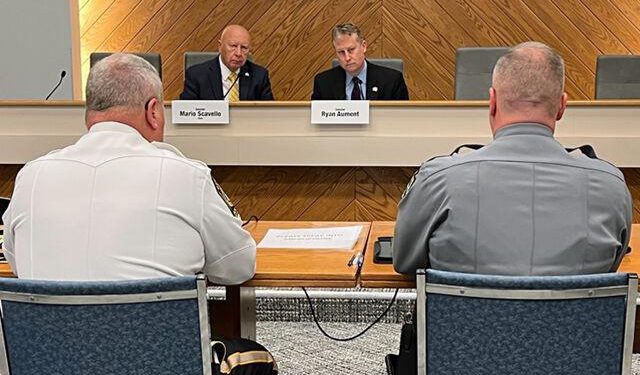By Anthony Hennen | The Center Square
(The Center Square) – The Pennsylvania Senate Majority Policy Committee’s second hearing on crime and public safety covered the struggle police departments face in hiring new officers, as the Center Square previously reported, but it also highlighted the importance of diversionary programs for drug addiction and the threat of human trafficking.
The first hearing centered on drug and mental health issues, and the need for more resources to address these problems.
During the second panel of the second hearing, Lancaster County District Attorney Heather Adams emphasized how crucial diversionary programs are in improving public safety.
It’s also important for district attorneys to support community-based initiatives to prevent crime and to develop alternatives for prosecution that address the root causes of crime,” Adams said. “By rehabilitating the defendant and addressing the behavior that goes to the root cause of their criminal behavior, they are less likely to reoffend and, therefore, public safety increases.”
Diversionary programs have gotten more attention in recent years, but Adams noted that they are not new: diversionary programs for DUI-related arrests existed in the 1990s, and programs were expanded to other crimes.
“I saw firsthand the success that is possible when someone can participate in a long-term, structured recovery program,” Adams said.
One diversionary program, SecondChancePA, is a collaboration between Blueprints for Addiction Recovery and police departments where officers offer someone to either enter treatment or the criminal justice system to get the help they need. A certified recovery specialist arrives at the scene to get someone into treatment within 24 hours. Lancaster County has 26 police departments participating in the program.
“The fact that they are offered treatment at such an early stage and so quickly can save a life,” Adams said.
Executive vice president of Blueprints and co-founder of SecondChancePA Benjamin McCoy noted the certified recovery specialists were the source of the program’s success, who “turned those flashing blue-and-red lights … into an opportunity and a gateway.” Police officers became stakeholders in community health, not just officials who would put someone in a cage, he said.
The program has “hundreds of cases of successful diversion,” McCoy said.
In addition to diversion programs, panelists noted the human trafficking problem in Lancaster County.
Human trafficking is the second-largest criminal enterprise after drug trafficking, Adams said.
Janelle Esbenshade, the interim executive director of the NorthStar Initiative, noted that drug traffickers often worked together with human traffickers, and victims can struggle to find stability.
To keep children safe, Esbenshade recommended adding information into the curriculum of public schools.
“We’ve got to get to those young boys and girls and really educate them about human trafficking,” she said.



